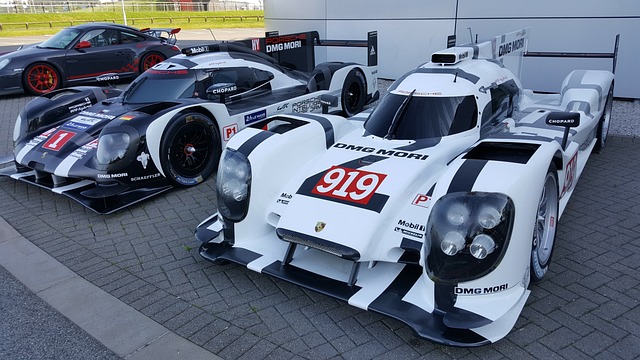The Need for Speed Beyond Formula 1
The world of motorsport is a cacophony of speed, technology, and sheer engineering brilliance. Recently, Porsche made waves with its 919 Tribute, a car that not only clinched victory at the prestigious 24 Hours of Le Mans but also left Formula 1 cars in the dust at the Spa-Francorchamps circuit. The question that echoes in the minds of racing enthusiasts is: Why isn’t Porsche on the Formula 1 grid? Let’s dive into the complex world of motorsport and unravel the mysteries behind Porsche’s strategic choices.
Setting Records: Porsche’s Dominance on the Nürburgring
Porsche’s 919 Tribute, with its jaw-dropping lap time of 5:19.5 at the Nürburgring, sent shockwaves through the racing community. What’s even more astounding is that Porsche clinches three out of the top four spots on the Nürburgring’s leaderboard. Even with the 919 Tribute dethroned at Spa, Porsche’s prowess remains evident. The Porsche 911 GT2 RS MR held the Nürburgring lap record from June 2021 to October, proving that Porsche’s dominance extends beyond endurance races.

Why Not Formula 1? The Marketing Conundrum
While the allure of Formula 1 is undeniable, Porsche has its reasons for steering clear of the pinnacle of single-seater racing. Unlike other manufacturers, Porsche doesn’t need F1 to sell more cars. The iconic 911 is a symbol of sports cars, etched into the collective consciousness. The backlog of orders for models like the 992 GT3 is already two to four years long. Porsche doesn’t need an F1 pedigree to convince buyers; the brand speaks for itself.

Endurance Matters: The Le Mans Connection
For Porsche, racing is not just a sport; it’s an essential part of engineering development. Traditionally, Porsche rarely enters consecutive races with the same car specification, emphasizing their commitment to constant improvement. Le Mans, with its grueling 24-hour format, provides the ultimate proving ground for Porsche’s commitment to building durable, high-performance cars.
Beyond the Track: Reliability and Longevity
The relevance of Le Mans for Porsche becomes even more apparent when examining the longevity and reliability of their road cars. A stark contrast emerges when comparing the engine life of an F1 car (rarely lasting over 1500 miles) to a Porsche road car, which can go well beyond 150,000 miles without a hitch. Porsche’s dedication to building robust engines finds a real-world application on the challenging tracks of Le Mans.
Engine Symphony: The Iconic Flat 6
Porsche’s association with the flat-6 engine is legendary. Synonymous with the brand, the flat-6 defines the auditory identity of a Porsche. Formula 1’s stringent engine regulations, however, do not allow Porsche to deploy their iconic flat-6. The distinctive engine note of a Porsche, an integral part of its allure, would be lost in the roaring chorus of F1 power units.
Sustainable Future: A Race for Green Technologies
Formula 1’s future engine regulations are pushing for sustainability, a goal aligned with Porsche’s commitment to keeping the combustion engine alive. Porsche aims to explore sustainable fuels to maintain the soul of their cars while being environmentally conscious. The synergy between F1’s push for sustainable fuels and Porsche’s commitment to preserving the combustion engine could be a potential meeting point in the future.

The Checkered Flag on F1 Dreams
In essence, Porsche’s absence from Formula 1 is not a void but a deliberate choice. The heart of Porsche’s engineering prowess lies in endurance races like Le Mans, where their cars are pushed to the limit for an unrelenting 24 hours. The 911’s iconic design, the reliability of their engines, and the unmistakable flat-6 sound are not just attributes; they are part of Porsche’s DNA.
FAQs
- Could Porsche join Formula 1 in the future? While it’s always a possibility, Porsche’s current focus on Le Mans and the unique engineering challenges of F1 make it seem unlikely in the near future.
- How does Porsche’s success in Le Mans impact its road cars? The durability and reliability proven on the tracks of Le Mans directly influence the engineering of Porsche’s road cars, contributing to their long life and robust performance.
- Is Formula 1 technology transferable to Porsche’s road cars? While some technologies might be transferable, Porsche’s emphasis on a distinctive engine note and the constraints of F1 regulations make a full-scale transfer challenging.
- What’s the significance of the flat-6 engine for Porsche? The flat-6 is an iconic part of Porsche’s identity. Its unique sound and performance characteristics contribute to the brand’s legendary status.
- How does Porsche view sustainability in motorsport? Porsche is actively exploring sustainable fuels to preserve the combustion engine’s soul while embracing environmentally conscious practices, aligning with Formula 1’s future goals.




